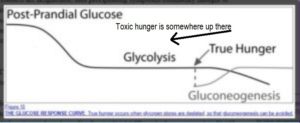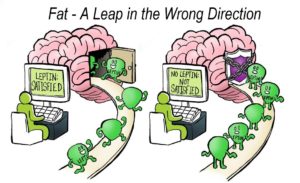
If you’re not familiar with leptin, it’s certainly familiar with you. Known by various nicknames, such as the ‘satiety hormone’ or ‘fat hormone’, leptin plays a leading role in daily dietary dramas. But, is it more responsible for over-eating (hyperphagia) and obesity than mere lack of will-power?
Blog Contents
What is leptin?
In healthy, non-obese individuals, the hormone leptin controls appetite. After you’ve eaten a meal, this anorexigenic (appetite-suppressing) hormone gets released by adipose tissue (fat cells) and acts on the hypothalamus in the brain to produce a feeling of satiety (fullness) which then suppresses the appetite and (hopefully) stops you from over-eating. It also speeds up your resting metabolism, thereby increasing energy expenditure. 1
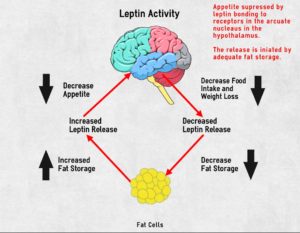
This is a pretty sensible mechanism, from an evolutionary point of view, since it would help stop members of our species from getting too fat to be able to run away from sabre-toothed tigers. 2
On the other hand, there were perfectly good reasons why we might have needed to store up as much fat as possible – to get through periods of famine, for instance. 3 This is why there are mechanisms, including the orexigenic (appetite-stimulating) hormone ghrelin (the “hunger hormone“) 4 , which act in the opposite direction from leptin, actively stimulating us to feel hungry. 5
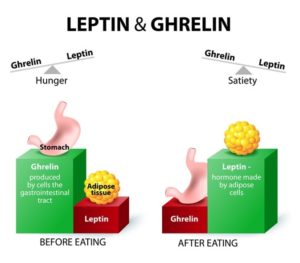
However, evolution wasn’t so good at predicting the appearance of McDonald’s Whoppers or Chocolate Hobnobs. And this is where the problem starts with leptin. If we continue to eat the ‘wrong’ foods, the brain doesn’t realise we’ve actually had enough to eat.
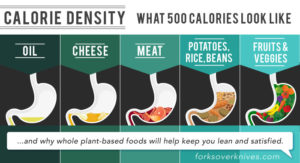
Before looking into a bit more detail about why leptin might not be doing its job properly – evident by the widespread increase in obesity – it’s worth mentioning that other mechanism supposed to help us moderate food intake – namely, stretch receptors in the stomach 6 . If these are supposed to activate as the stomach expands in size, you can see from the above graphic that high-calorie/low-bulk foods will not stretch the stomach as much as low-calorie/high-bulk foods – that is, plant foods which are high in fibre content.
Such foods (mostly processed with high levels of sugar, saturated fat and salt) tend to be high in calories but low in nutrients (such as fibre, vitamins, minerals and phytonutrients). 7 . This is where we come across the differences between toxic hunger and real hunger, as discussed in a previous blog 8 . It’s called “toxic” because it can end up causing us to chronically over-eat and become obese, resulting in all the nasty associated problems like type 2 diabetes, heart disease and various cancers.
Leptin – Animal-Eaters vs Plant-Eaters
So, turning back to leptin, a recent study 9 took a small number of healthy women from three different dietary groups: omnivores, lacto-ovo-vegetarians, and vegans to see if there were any difference in leptin levels between them. What they found was in line with previous studies 10 11 12 , namely: “…people who adopted a vegetarian dietary pattern had lower plasma levels of leptin when compared to the meat consumers.” The mean plasma leptin levels were:
- omnivores – 7.45 ng/ml
- lacto-ovo-vegetarians – 3.87 ng/ml
- vegans – 2.89 ng/ml
Leptin & Obesity
It’s well-established that meat-eaters are more likely than plant-eaters to become obese 13 14 . So, does this mean that meat-eaters don’t have enough leptin to inform their brains that they have eaten enough, and that plant-eaters have too much leptin? Oddly enough, quite the reverse.
Leptin Insensitivity/Resistance
What’s actually happening is that the abundance of swollen fat cells produce so much leptin that the hypothalamus starts to become insensitive and eventually resistant to leptin’s action. Thus, the brain keeps telling the obese individual “You’re still hungry!“. Eating plant-based diets – ideally WFPB diets, since vegan diets can still lead to obesity if they contain loads of junk food 15 – does not result in such fat storage in the body and, hence, leptin continues to do its job without the body getting “fed up of it”…
You’ve probably already drawn a parallel here with leptin resistance/insensitivity – namely, to type 2 diabetes. By definition, T2D is a condition which transitions through a stage where the pancreas still pumps plenty of insulin into the bloodstream, but cells become resistant/insensitive to it 16 .
It’s similar to how taste buds become insensitive to salt and sugar, how one can develop tolerance for cigarettes or alcohol, even though the body is silently screaming.

Do I Need To Increase Leptin levels?
Perhaps the more appropriate question should be “How do I make my body more sensitive to the already high levels of leptin in my body?”
The simplest and healthiest way is likely to be through changing to a plant-based diet. Not only is this likely to clear up any existing problem with leptin resistance, it will also help to reverse a huge range of diseases – including obesity 17 , type 2 diabetes 18 , cardiovascular disease 19 , and even many cancers 20 .
Final thoughts
The above brief analysis has suggested that, A. leptin works best within non-obese bodies and, B. that non-obese bodies are more likely to be inhabited by plant-eaters than by meat-eaters.
We also know that plant-eaters are less likely than omnivores to suffer from metabolic syndrome – a complex of conditions in which triglycerides, total cholesterol, low-density lipoprotein (LDL), blood glucose, blood pressure, waist circumference, and body mass index (BMI) are all increased to seriously unhealthy levels21 .
It’s The Fat!
And much of the problem is simply to do with the amount of fat within the body – not that we grow more fat cells, since we actually retain a reasonably constant number of fat cells throughout adult life 22 , rather the fat cells we have can grow and grow until they’re so stuffed full that they leach fat back into the bloodstream without us even needing to consume any dietary fat – a process known as “reintoxication” 23 Yuk!
So What About Will-Power?
It’s so easy to think that overweight/obese individuals lack sufficient will-power. However, it may be more likely that they are simply acting in accordance with what their brain is telling them or, rather, what their brain is failing to tell them.
How Do I Know If I’m Leptin Resistant?
It may sound too simple, but – just look in the mirror or see if you can grab a handful of fat around the middle of your body. Basically, there’s a really strong chance that leptin is not doing its job inside you if you are overweight.
How Do I Reverse Leptin Resistance?
I keep hammering away at this…but, all the evidence strongly suggests that the healthiest, most natural and sustainable diet for weight loss, general disease-resistance and healthy longevity is a wholefood plant-based diet. 24 25 . It’s also probably the healthiest for the rest of life on Earth, too 26 .
How about having a go at the short quiz below?
[qsm quiz=18]
References
- Waugh, Anne; Grant, Allison. Ross & Wilson Anatomy and Physiology in Health and Illness E-Book (p. 284). Elsevier Health Sciences. Kindle Edition. [↩]
- The evolution of body fatness: trading off disease and predation risk. John R. Speakman. [↩]
- A Nonadaptive Scenario Explaining the Genetic Predisposition to Obesity: The “Predation Release” Hypothesis. Literature Review. Cell Metabolism 6(1):5-12 · August 2007. [↩]
- Ghrelin is the primary hunger hormone. It’s released from your stomach (with smaller amounts being released by the small intestine, pancreas and brain) into the blood and to the brain to stimulate hunger to alert you that you’re hungry. It has many functions throughout your body besides hunger. It also functions within the pleasure/reward centre of the brain, and plays a role in memory formation, immune function, and even sleep. [↩]
- Curr Opin Clin Nutr Metab Care. 2013 Nov; 16(6): 619–624. Ghrelin: much more than a hunger hormone. Geetali Pradhan, Susan L. Samson, and Yuxiang Sun. [↩]
- Paintal, A. S. (1954). A study of gastric stretch receptors. Their role in the peripheral mechanism of satiation of hunger and thirst. The Journal of Physiology, 126(2), 255–270. [↩]
- Health = Nutrient Intake ÷ Calories [↩]
- Toxic Hunger vs Real Hunger [↩]
- Association between different types of plant-based diets and leptin levels in healthy volunteers. Gogga P, Śliwińska A, Aleksandrowicz-Wrona E, Małgorzewicz S. Acta Biochim Pol. 2019 Feb 15. doi: 10.18388/abp.2018_2725. [↩]
- AmbroszkiewiczJ,Laskowska-Klita T,Klemarczyk W (2004) Low se-rum leptin concentration in vegetarian prepubertal children. Rocz Akad Med Bialymst 49: 103–105. [↩]
- AmbroszkiewiczJ,Klemarczyk W,Gajewska J,Chełchowska M,Ro-wicka G, Ołtarzewski M, Laskowska-Klita T (2011) Serum concen-tration of adipocytokines in prepubertal vegetarian and omnivorous children. Med Wieku Rozwoj 15: 326–334 [↩]
- Kim MH, Bae YJ (2015) Comparative study of serum leptin and insu-lin resistance levels betweenKorean postmenopausalvegetarianandnon-vegetarian women. Clin Nutr Res 4: 175–181. [↩]
- Int J Obes (Lond). 2009 Jun; 33(6): 621–628. Meat consumption is associated with obesity and central obesity among US adults. Y Wang and MA Beydoun. [↩]
- Vegetarian diets and childhood obesity prevention. Joan Sabaté Michelle Wien. The American Journal of Clinical Nutrition, Volume 91, Issue 5, 1 May 2010, Pages 1525S–1529S. [↩]
- Greggs’ Vegan Sausage Rolls – Why Veganism Can Fail [↩]
- Every vampire needs an invitation [↩]
- CNS: Morbid Obesity Solution: A Long-Term Plant-Based Case Study. Roberta Russell. January 24, 2017. [↩]
- J Geriatr Cardiol. 2017 May; 14(5): 342–354. A plant-based diet for the prevention and treatment of type 2 diabetes. Michelle McMacken and Sapana Shah. [↩]
- J Geriatr Cardiol. 2017 May; 14(5): 317–320. A plant-based diet and coronary artery disease: a mandate for effective therapy. Caldwell B Esselstyn. [↩]
- Surely Foods Can’t Fight Cancer [↩]
- RizzoNS,Sabaté J,Jaceldo-Siegl K,Fraser GE (2011) Vegetariandietary patterns are associated with a lower risk of metabolic syn-drome: the adventist health study 2. Diabetes Care 34: 1225–1227. [↩]
- NIH RESEARCH MATTERS. May 12, 2008. Fat Cell Numbers in Teen Years Linger for a Lifetime. [↩]
- Br J Pharmacol. 2009 Nov; 158(5): 1330–1337. Reintoxication: the release of fat-stored Δ9-tetrahydrocannabinol (THC) into blood is enhanced by food deprivation or ACTH exposure. N Gunasekaran et al. [↩]
- Which Diets Work for Weight-Loss? [↩]
- Vegetarian Diets and the Risk of Diabetes [↩]
- A Sustainable Diet for Our Planet [↩]
